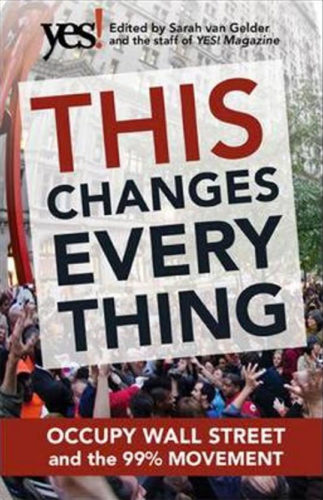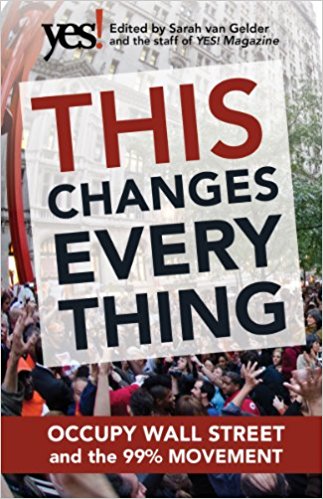
Even today, as local authorities around the country mobilize their police forces to dismantle the encampments of the Occupy movement, it’s difficult to have any conversation about the U.S. economy without confronting the harsh financial reality faced by the majority of Americans today. If the mostly young people who have braved cold nights and police batons to cast a spotlight on this man-made disaster are now being forced to scatter, there seems little question that the terms of the national debate on economics have been altered by their courage. After all, who today doesn’t recognize what they mean by “the 99%” and “the 1%?” They’ve turned the sort of dry statistics that cause our eyes to glaze over into memes that have made their way into every nook and cranny of our society.
This Changes Everything: Occupy Wall Street and the 99% Movement edited by Sarah van Gelder and the staff of Yes! Magazine ★★★★☆
How all this came about and what we can learn from it is the subject of This Changes Everything. This instant book — published November 4, 2011, barely six weeks after the first occupation in New York City on September 17 — is the result of an unusual collaboration between the publisher, San Francisco-based Berrett-Koehler Publishers, and the editors of Yes! Magazine. which hails from Bainbridge Island, Washington, near Seattle.
In a fast-paced series of short articles, this well-organized little book brings together the thoughts and observations of several individuals critical to the launching of the Occupy movement as well as a number of outside observers who are close to the movement. In these pages, you’ll find recognizable names — Ralph Nader and Naomi Klein, for example — as well as those who are far less well known. They include writers and poets, but all appear to be activists.
Not a single point of view but several
As an anthology, This Changes Everything doesn’t convey a single point of view but rather a range of approaches that share only their sympathy for the movement and a conviction that the economy of the U.S. and the world has veered sharply off course in a dangerous direction. The contributors include the usual mix of perspectives found on the American Left today, from issue-focused community organizers to progressive thinkers concerned above all with the Big Picture questions of global warming and economic justice, to anarchists whose focus is on the ways and means of organizing.
If for some reason you’re wondering why Occupy Wall Street hasn’t settled on a specific set of demands, you’ll find the explanation here: “The system is broken in so many ways that it’s dizzying to try to name them all . . . The one thing the protestors all seem to agree on is that the middle-class way of life is moving out of reach.” Clearly, they would also subscribe to the judgment that “Much of what provides profits to Wall Street is, or should be, illegal.”
Others can translate these truths into practical proposals. The value the Occupy movement brings to the table is the ability to make us think, and think hard, about the roots of our deplorable economic circumstances.
For further reading
Like to read books about politics and current affairs? Check out Top 10 nonfiction books about politics (plus dozens of runners-up).
If you enjoy reading nonfiction in general, you might also enjoy:
- Science explained in 10 excellent popular books
- Great biographies I’ve reviewed: my 10 favorites
- Top 10 nonfiction books about politics
And you can always find my most popular reviews, and the most recent ones, plus a guide to this whole site, on the Home Page.


























